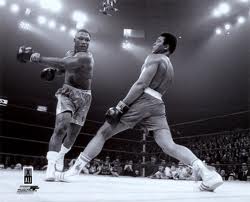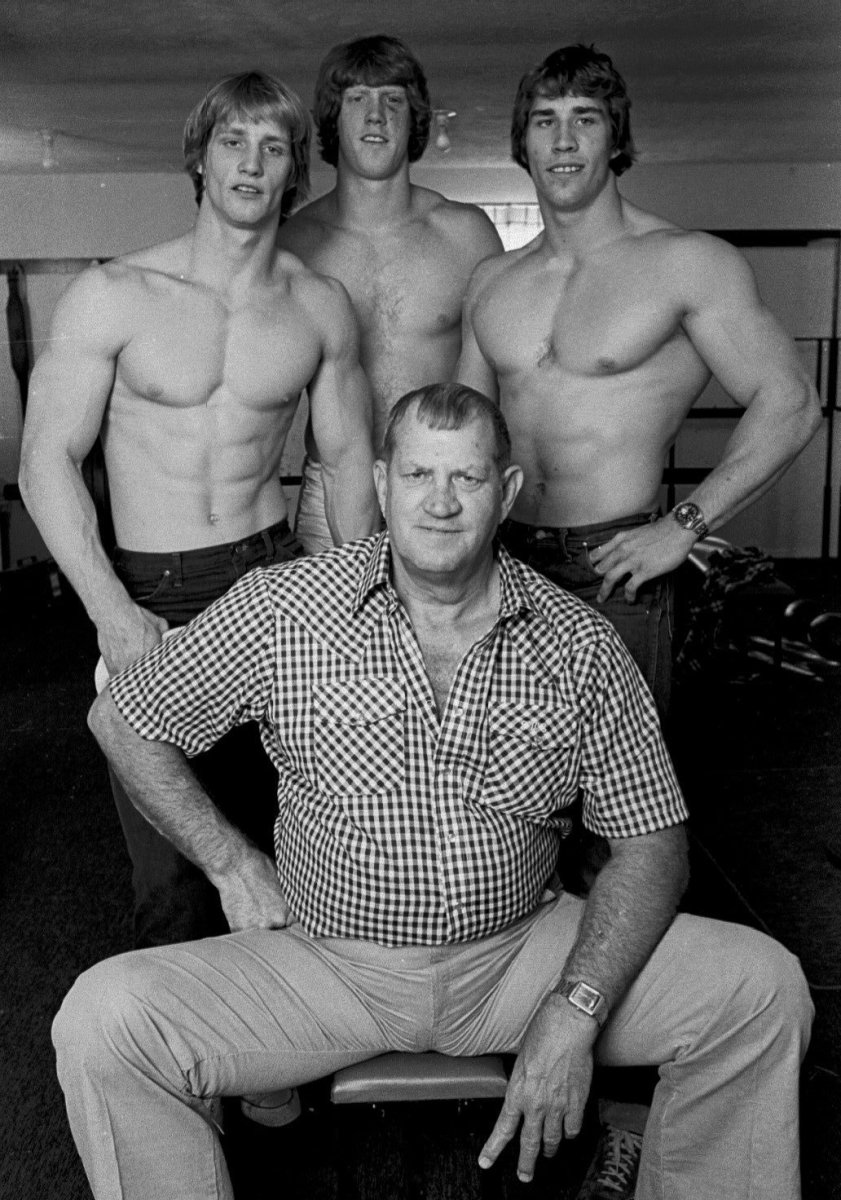Muhammad Ali and Joe Frazier: The Greatest boxing rivalry ever
Joe Frazier (left) vs. Muhammad Ali in MSG in NY

Boxing's Greatest Rivaly: Frazier and Ali
The most famous rivalry in the history of boxing, and possibly the fiercest, was the bitter feud between Muhammad Ali and Joe Frazier. Their antagonism-filled duel of fists and words consisted of three hard-fought battles (1971-75) and verbal sparring, which echoed social issues of the day and polarized many Americans who saw the ramifications of their combat as being more far reaching than the boxing ring.
Muhammad Ali—born Cassius Clay before joining the nation of Islam and changing his name--had won the World Heavyweight boxing title from Sonny Liston in 1964. He was a controversial figure in his day. At the height of the civil rights movement and race riots, Ali was a very outspoken champion of what he called “Black power”. He was more vocal than many people (particularly White Americans) were comfortable with in the 1960s. His conversion to Islam and subsequent friendship with the even more controversial Malcolm X infuriated a large segment of the public. Ali received many death threats.
Never one to avoid trouble, Ali further raised the ire of his detractors due to his famous conceit and braggadocio. He boasted constantly about being the “Greatest of all time” and swore that he was unbeatable. He praised his good looks (“I’m so pretty” he used to say) and called other boxers ugly. He used his quick wit and verbal dexterity to mock his opponents and win a psychological edge over them. This lack of humility from a Black Man in the 60s brought a good deal of criticism and even outright hatred toward Ali.
Ali remained undefeated heavyweight champion until 1967 when he was stripped of his title by the boxing commission for refusing to report for selective service. With the Vietnam War underway, Ali was called to the draft but refused to report to the induction center, claiming that his religious beliefs forbade him taking a life. He further claimed that the Vietnamese weren’t his enemy but White America was. He refused to kill Asians in the name of the United States government. Using the resources of the nation of Islam, Ali fought a long court battle in order to keep himself out of jail and out of the military. This gave his detractors more ammunition to use against him. They added “draft dodger” to Ali’s list of sins.
The boxing commission stripped Ali of his title because of all this. The two boxing leagues WBA and WBC both set out to choose a new champion. The WBA arranged an 8-man boxing tournament, which was won by Jimmy Ellis. Meanwhile, the top two WBC contenders Buster Mathis and Joe Frazier fought it out for supremacy in their division, with Frazier emerging victorious. Frazier then fought Ellis for the unified world championship. Frazier defeated Ellis to become the new, undisputed World Heavyweight boxing champion.
But despite the “undisputed” title, there was a lot of dispute. Many boxing fans didn’t accept Frazier as the champion, because they still saw Ali as the rightful title holder. Ali had never been defeated and it was only due to his legal woes that he was no longer in possession of the championship belt. Many perceived Frazier as a pretender to the throne, or as an opportunist who’d grabbed the title while the ‘real’ champion was suffering a forced exile. Despite Frazier’s continued undefeated winning streak, he couldn’t escape Ali’s shadow.
Frazier desperately wanted to fight Ali so he could erase this doubt and prove himself the true champion. He publicly supported Ali and implored the boxing commission to reinstate Ali. When his efforts to get Ali reinstated failed, he lent Ali money so that Ali could continue his legal battle.
During this early period, both men were friendly and respectful to each other. Frazier publicly praised Ali as a great champion and Ali privately expressed his gratitude to Frazier (although he would never say it in public).
In 1970, after three years in boxing exile, Muhammad Ali won his court case and was acquitted of all charges. The boxing commission returned his license and Ali immediately went into training for his highly anticipated battle with Frazier. A few months later, Ali had a ‘warm-up match’ against Jerry Quarry (who was known as ‘The Great White Hope’ and therefore an ironically appropriate opponent for Ali’s return match) to shake off the ring-rust. Ali defeated Quarry and preparations were made for the Frazier fight.
In the days prior to the fight, Ali surprised Frazier with the abrupt reversal of his formerly friendly stance. Ali suddenly began a series of nasty verbal attacks on Frazier. While it wasn’t unusual for Ali to employ insults and psychological warfare against a foe, his vocal barbs against Frazier seemed particularly vicious and relentless. Joe Frazier was stunned by the ferocity of Ali’s verbal attack.
Along with his usual technique of mocking his opponent’s looks, skill and intelligence, Ali figuratively hit Frazier below the belt by calling him an “Uncle Tom”. (An unflattering slang term for a Black Man who acts subserviently toward white people. The term comes from Harriet Beecher Stowe’s 1852 novel Uncle Tom’s Cabin about a passive black slave.) It was part of Ali’s mental strategy against Frazier. Since Frazier’s contract had been purchased by a conglomerate of White owned corporations, and considering Frazier had been silent regarding civil rights issues, Ali used rhetoric to paint a picture of Frazier as a puppet for White corporate America.
Frazier took this very personally. He was shocked that Ali would treat him this way, especially after all the help and money Frazier had given Ali during Ali’s three year suspension. Frazier felt that Ali’s tactics were completely uncalled for and went far beyond the usual mind games. (As the crescendo of his mind games, Ali showed up at Frazier’s hotel the day before the fight and started shooting off a gun.)
As the day of the big fight drew closer, boxing fans (and even many non-fans) became polarized by Ali’s campaign to turn his fight with Frazier into a black-vs.-white issue, despite both participants being black. Ali had positioned himself as the champion of the Black race and had maneuvered Frazer into the role of the White man’s hitman. People lined up behind the combatants accordingly. Blacks and young, liberal white people supported Ali. Older, more conservative whites backed Frazier, hoping he’d shut Ali’s mouth for good.
The long awaited fight day came, in March 1971 at MadisonSquareGarden in New York, and it was the biggest thing ever in boxing at the time. It was the first time two undefeated champions would fight for supremacy. Tickets were nearly impossible to get. Celebrities of the day took up all the best seats. Some even participated in events. (Burt Lancaster did pre-fight interviews and Frank Sinatra was a ring-side photographer.)
When the fight finally began, Ali came on strong and controlled the early rounds by dancing and dodging, using his hit and-run style, hoping to wear Frazier down. But Frazier soon turned the tide, with vicious blows to Ali’s body. Frazier dominated the rest of the fight, battering Ali severely. Frazier was clearly ahead on points going into the final round. Ali came on strong in that last round, hoping to score a knock-out. But his aggressive tactics backfired and he walked into a powerful left hand from Frazier and got knocked down. Ali surprised everyone by getting back up (Up till then, when Frazier had floored someone, they stayed down) but the damage had been done. Frazier scored big in the final round.
Frazier won a unanimous decision from all three ringside judges and was pronounced the winner. Frazier had kept his World Title and ended Ali’s undefeated record. This was Frazier’s most satisfying victory. He had avenged himself against Ali’s slander and proved that he wasn’t just a pretender to the throne. He was finally the undisputed champion.
Ali did his best to dispute it, however. He claimed that the referee and judges (who were all white) were biased. He pointed out that Frazier spent more time in the hospital after the match than Ali had. Ali used every tactic he could think of to create doubt about the fight’s result and bait Frazier into a rematch.
Soon after, Joe Frazier lost his World Heavyweight Title to the powerful George Foreman. Foreman brutalized Frazier, knocking him down 6 times and knocking him out in the second round. No one had ever imagined they’d see Frazier manhandled like that. Frazier’s undefeated record was gone, as was his title belt.
Frazier wanted a rematch against Foreman, but Ali pointed out that Frazier had already had his shot at Foreman and failed, therefore it was Ai’s turn to tackle Foreman. To settle the dispute, a rematch between Frazier and Ali was arranged to see who was the legitimate top contender. Ali saw this as not only a stepping stone to Foreman’s title but also a chance to avenge his defeat at Frazier’s hands.
The build up to the fight saw Ali return to his usual shenanigans. He resumed his verbal warfare. When the two met face-to-face on a televised interview, Ali so infuriated Frazier that Frazier had to be restrained from striking Ali. But While Frazier was being calmed, Ali abruptly tackled him to the floor and the two started wrestling on television. It was hard for security to separate them.
The second fight was also at MadisonSquareGarden, in 1973. It lacked the drama and massive media buzz of the first match, because there was no title on the line, nor was either man still undefeated. However, it was a big event because of the bad blood between the two.
The second fight was the least entertaining and least hard fought of their three battles. Frazier seemed off his game after his humiliating loss to Foreman. Ali fought an uncharacteristically cautious fight. He was later criticized for holding and clinching Frazier too often during the fight (An unsportsmanlike tactic designed to prevent an opponent from delivering effective body blows) which further threw Frazier off his game. The comparatively lackluster fight ended with Ali winning on Judge’s points.
Ali was a happy man. Not only had he defeated his rival Frazier, he was now the number one contender to Foreman’s world title. The Ali-Foreman match took place in Zaire (1974). Ali called it “the Rumble in the Jungle”. Despite Ali being the underdog in the fight (After the way Foreman had destroyed Frazier, Foreman was considered unbeatable. Ali was now over 30 and no one thought he had a chance against the younger Foreman’s superior strength.) Ali once again proved that he had some surprises left.
To counter Foreman’s devastating power, Ali invented the rope-a-dope style (Leaning back against the ropes to allow the ropes to absorb the impact of the blow.) Foreman, who’d never had a very long fight before (having knocked all his opponents out early) eventually wore himself out until he could barely throw a punch anymore. Ali made a sudden 8th round comeback and quickly pummeled Foreman with a flurry of blows. Foreman fell in the eighth round and Ali won his title back by knock-out.
Ali was again on top of the world, having regained his championship. Joe Frazier challenged Ali to another match. Ali, feeling that Frazier was now a has-been (He’d never been the same since his loss to Foreman), accepted the challenge. Ali wanted to erase all doubt and prove he was better than Frazier. He felt this third and decisive match would prove who the better man was.
The fight was set to take place in Manila, in October 1975. Before the match, Ali amped up his psychological warfare by referring to Frazier as a Gorilla (Another derogatory term used for Black men in the 1960s and 70s.) Ali bought himself a rubber gorilla toy and would punch it repeatedly during interviews to demonstrate what he’d do to Frazier. He even boxed a sparring partner in a gorilla suit. Ali’s famous poem before the fight was “It’ll be a killa’ and a thrilla’ when I get the Gorilla in Manila!”
The Manila fight took place outdoors on an extremely hot, humid day. Although people thought Frazier was a spent force, he proved himself otherwise. The “Thrilla’ in Manila” is considered one of the greatest fights ever.
Ali started the fight using the surprising tactic of going toe-to-toe with the stronger Frazier. Ali held his own for the first two rounds but the strategy was wearing thin by round three and Ali switched to his trademark hit-and-run technique. But by the fifth round, Frazier started to take control. He spent the next seven rounds basically beating Ali up. It was only Ali’s impressive ability to take a beating that allowed him to endure the merciless battering.
Things changed in round 12 when Frazier started having vision problems. Unbeknownst to most people, Frazier had been suffering slow vision loss in his left eye for years. The problem had been exacerbated by the horrible pummeling he received from Foreman. He was having trouble seeing out of his left eye. During the Manila fight, Frazier’s right eye swelled up until Frazier could barely see out of it. His vision was impaired in both eyes and he was almost fighting blind.
Ali sensed something was wrong and rallied in the twelfth round. He called up his remaining strength and spent the next three rounds hitting Frazier with everything he had left. Practically blind, Frazier was a punching bag for Ali’s blows. To Frazier’s credit, he would not fall.
Frazier staggered back to his corner on rubbery legs after the 14th round. Meanwhile, Ali himself was so exhausted, battered and suffering from intense heat that he doubted he could last the final round. His trainer Angelo Dundee gave him a pep talk to get him to finish the fight.
The opposite thing was going on in Frazier’s corner. His trainer wanted to stop the fight because Frazier couldn’t see. But Frazier was determined to continue the fight, even if it meant serious permanent injury. However, Frazier was overruled by his trainer who threw in the towel. The fight was over, and Frazier’s last hurrah was over!
The moment the fight ended, Ali (the adrenaline fading) collapsed to the ground and had to be carried to his dressing room. (He later said it was the closest he ever felt to dying.) He called Frasier’s young son Marvis to his dressing room and apologized to the boy for all the horrible things he’d said about Joe. Marvis relayed the apology to his father, who didn’t accept it. He wanted Ali to apologize to him personally and publicly, which was the way he’d insulted Frazier.
Years later, Ali would retract many of the statement he made about Frazier, maintaining that he was only doing it to promote the fights. He claimed later to respect Frazier. Frazier, on the other hand, maintained animosity against Ali.
For over thirty years, Frazier had nothing good to say about Ali. He seemed to almost revel in the fact that Ali ended up with Parkinson’s disease, considering it Karmic justice for the things Ali said about him. However, though Frazier retained good his health for decades, he went bankrupt in the years following his boxing heyday and lived his final years in a small room over the gym he owned, where he made a moderate living training youngsters in boxing. Ali, on the other hand, still retains his vast fortune, if not his health.
Joe Frazier passed away on November 7th, 2011 from liver cancer. He was 67. He's been rated by experts as one of the top 10 greatest boxers of all time.
The legacy these two left remains indisputable and their rivalry was the stuff of legends.



